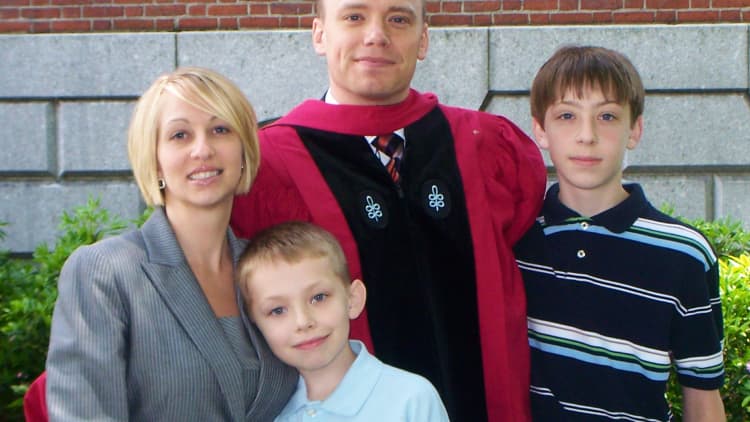
When Todd Rose was young, he struggled with academics. His senior year in high school, he had a 0.9 grade point average and was kicked out before graduating.
Yet with the help of smart savings strategies, student loans and perseverance, Rose managed to turn his situation around. He is now a lecturer in education at Harvard University. Here's how he did it.
From dropout to Harvard
By the time Rose was 21, he had two kids, was working minimum-wage jobs and relied on welfare to get by. He said he held close to a dozen jobs after dropping out of high school.
But thanks to advice from his father, Rose returned to school to get his GED diploma and enrolled at Weber State University in Ogden, Utah. His parents and in-laws pooled enough money to pay for his first year's tuition.
To cover the difference, Rose took out government loans, and he had a job selling chain-link fences during the day, while attending classes at night.
After his first year, Todd had straight A's and won an academic scholarship to cover his tuition.
Rose graduated from Weber State at the top of his class and with $40,000 in student loans. He went on to Harvard for his doctorate in human development with a partial scholarship that helped cover some of the tuition. Rose also took out loans and worked as a teaching assistant for two to three classes each semester, earning $1,000 a month for each class.
Rose earned his doctorate from the Harvard Graduate School of Education. He also completed a postdoctoral fellowship at the Harvard-Smithsonian Center for Astrophysics.
Right now, Rose's student debt has grown to about $180,000, but he says he has worked out smart spending and saving strategies to pay it off, including consolidating his loans at an interest rate that's below inflation.
I realized that I would not have credit cards; I would only have debit cards. So that way, if I did make an impulsive purchase, I would immediately feel the pain.Todd Rose
He now pays $1,200 every month on his student loan debt. He puts much of the rest of his income toward catching up on retirement investments and investing in bigger assets, like buying a home.
His savings tips
One of the things he says he regrets the most was that he did not start saving earlier to enjoy the benefits of compound interest over time — "the ability to put even a little bit away, even when things are tough because of what it buys you in the back end."
Rose also stresses the importance of achieving financial stability. Before he could think about how to invest his money, he needed to make sure he was being smart about the ways he spent his cash.
For him, that meant eliminating credit from his life. "I realized that I would not have credit cards; I would only have debit cards. So that way, if I did make an impulsive purchase, I would immediately feel the pain."
More from Invest in You:
Want a stronger economy? Support financially literate girls and women
Tuition-free college is now a reality in nearly 20 states
Five easy ways to save $1,000 in three months
Disclosure: NBCUniversal and Comcast Ventures are investors in Acorns.





